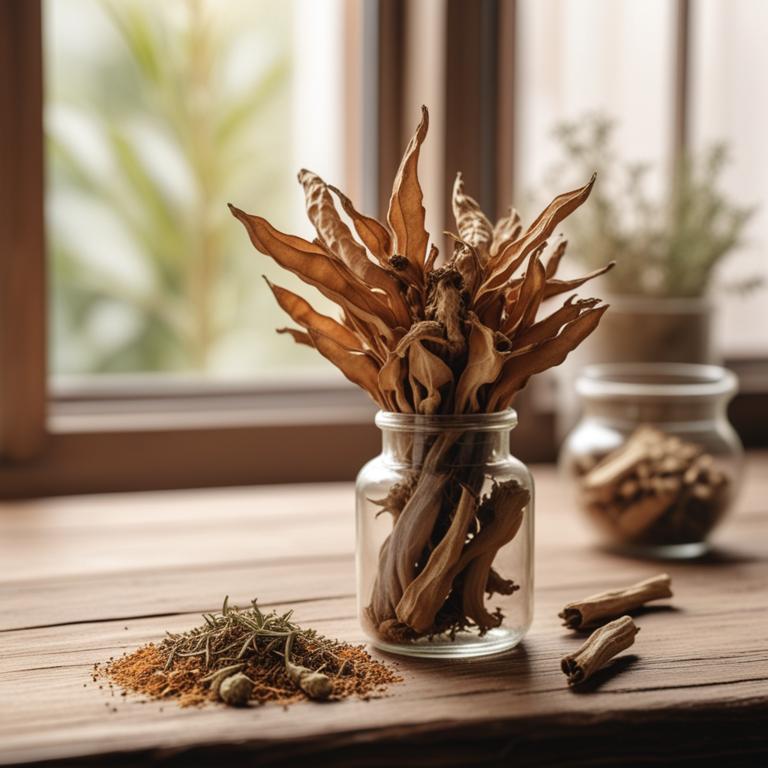Updated: Dec 1, 2024
Jaw Lock: Causes, Medicinal Herbs, and Alternative Herbal Treatments
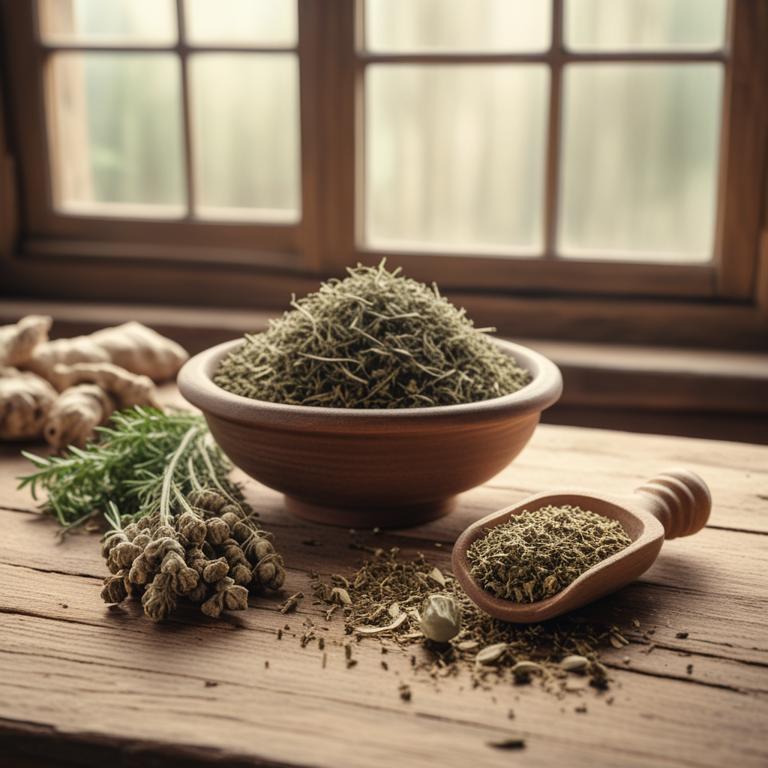
Jaw lock, also known as temporomandibular joint (TMJ) disorder, is a common condition where the jaw joint becomes inflamed, causing pain and stiffness in the jaw, face, and ears.
This can make everyday activities like eating, speaking, and even smiling a challenge. The constant discomfort can also affect your mood and overall well-being, making it difficult to concentrate and enjoy life. The causes of jaw lock can be varied, but often include teeth grinding, poor biting habits, stress, and anxiety. Clenching the jaw muscles while sleeping or engaging in strenuous activities can also contribute to the problem. Fortunately, herbal remedies can provide relief from jaw lock.
Certain herbs like ginger, turmeric, and willow bark have anti-inflammatory properties that can help reduce swelling and pain in the jaw joint. These herbs can also help relax the jaw muscles, making it easier to open and close the mouth without discomfort. To use these herbs for jaw lock, you can try making teas or infusions. Steep fresh ginger root or dried turmeric powder in hot water to make a soothing tea. Alternatively, you can chew on willow bark sticks or add dried willow bark to a warm bath to relax the muscles. Some herbal supplements, like omega-3 fatty acids found in flaxseed oil, can also be taken to reduce inflammation and promote healing.
Drinking plenty of water and practicing stress-reducing techniques, like meditation or deep breathing, can also help alleviate jaw lock symptoms.
Table of Contents
What causes jaw lock to occur?
The main causes of jaw lock are complex, but some of the most common culprits include TMJ Disorder, Temporomandibular Joint Inflammation, dental work, anxiety, and stress.
TMJ Disorder is a condition where the temporomandibular joint, which connects the jawbone to the skull, becomes misaligned or damaged. This can lead to pain and stiffness in the jaw, making it difficult to open or close it properly. Temporomandibular Joint Inflammation, on the other hand, is a condition where the joint becomes inflamed, usually due to injury or overuse. This can cause the joint to lock up, making it hard to move the jaw.
Dental work, such as having a new crown or filling, can also cause jaw lock. This is because the new work can put pressure on the jaw joint, causing it to become misaligned or inflamed. Anxiety and stress can also contribute to jaw lock. When we're feeling anxious or stressed, we tend to clench our jaw muscles, which can put pressure on the temporomandibular joint and cause it to lock up.
All of these causes can lead to jaw lock, which is when the jaw becomes stuck or unable to move properly.
What are the benefits of utilizing herbs for jaw lock relief?
Using herbs for jaw lock can be a game-changer.
They can help reduce swelling and pain, making it easier to open your mouth and eat. Some herbs have anti-inflammatory properties that can calm down the jaw muscles and get rid of the tension.
This can also help prevent jaw lock from happening in the first place, by keeping the muscles relaxed. Additionally, these herbs can help reduce stress and anxiety, which are common causes of jaw lock. Some herbs can even help improve digestion and reduce sinus pressure, which can also contribute to jaw lock.
By using these herbs, you can get relief from the pain and discomfort of jaw lock and enjoy a more comfortable, relaxed life.
What are the key medical herbs for jaw lock treatment?

If you're experiencing jaw lock, also known as lockjaw, it's essential to try natural remedies that can help ease the pain and tension.
One effective way to do this is by using certain herbs that have anti-inflammatory and soothing properties. Zingiber officinale, also known as ginger, is a great option. It contains compounds called gingerols and shogaols, which can help reduce swelling and ease pain in the jaw area. Curcuma longa, or turmeric, is another herb that's commonly used to treat inflammation. It contains a powerful compound called curcumin, which has potent anti-inflammatory and antioxidant properties. Piper nigrum, or black pepper, may seem like an unlikely herb to treat jaw lock, but it contains a compound called piperine, which can help increase blood flow to the affected area.
This increased blood flow can help reduce swelling and ease pain. Glycyrrhiza glabra, or licorice root, has been used for centuries to treat various health issues, including jaw lock. It contains compounds called glycyrrhizin and licoricidin, which can help reduce inflammation and soothe the muscles in the jaw area. Cinnamomum verum, or cinnamon, is another herb that can help ease jaw lock. It contains compounds called cinnamaldehyde and cinnamyl acetate, which can help reduce inflammation and ease pain. When used together, these herbs can provide a powerful combination of anti-inflammatory and soothing properties that can help alleviate jaw lock. You can try making a tea by steeping the herbs in hot water, or apply a topical paste or oil to the affected area.
Be sure to consult with a healthcare professional before using any new herbal remedies, especially if you have any underlying health conditions or allergies.
What are the top herbal remedies for jaw lock?
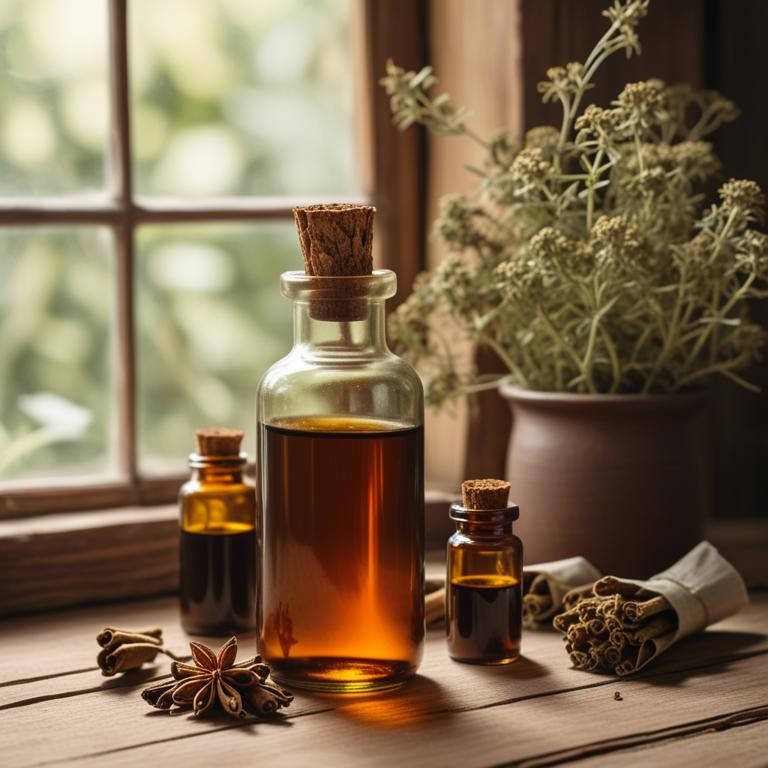
Herbal preparations can be a great way to help with jaw lock, a condition where the jaw gets stuck or locked in place.
A decoction is a strong herbal tea made by boiling herbs in water, which can be applied directly to the jaw area to help relax the muscles. This can be especially helpful if you have a cold or flu, as it can help loosen up congestion and reduce pain. A tincture is a liquid extract of herbs that can be taken orally or applied topically to the affected area. It's often easier to take than a decoction, and can be added to water or taken straight from a dropper. Some herbs like valerian root are known for their relaxing properties, which can help calm the muscles and reduce tension. If you prefer to take your herbs in a more convenient form, you can try a capsule.
These are small, easy-to-swallow pills that contain a concentrated dose of herbs. Look for capsules made from natural ingredients like gelatin or plant-based cellulose, and choose herbs that are known for their anti-inflammatory or pain-relieving properties. An infusion is similar to a decoction, but it's made by steeping herbs in hot water rather than boiling them. This can be a gentler way to get the benefits of herbs, especially if you have sensitive teeth or gums. You can make an infusion by steeping herbs like peppermint or chamomile in hot water, then straining the liquid and applying it to the affected area. A salve is a topical cream or ointment made from herbs, which can be applied directly to the jaw area to help reduce pain and inflammation. Look for salves that contain herbs like arnica or calendula, which are known for their anti-inflammatory properties.
You can apply a salve to the affected area several times a day to help reduce discomfort and promote healing.
Additional Resources:
Are there any herbs that you should avoid using if you have jaw lock?
If you have jaw lock, also known as temporomandibular joint disorder (TMJ), it's best to avoid certain herbs that can make the condition worse.
Echinacea purpurea, for example, can cause muscle contractions and spasms, which might exacerbate jaw lock. This is because the herb has compounds that can stimulate the nervous system and lead to involuntary muscle movements. Aconitum carmichaelii, also known as monk's hood, contains toxins that can affect the nervous system, leading to symptoms like numbness, tingling, and muscle weakness. If you're already experiencing jaw lock, using this herb could make the condition more uncomfortable and painful. Aristolochia clematitis, or birthwort, has been linked to kidney damage and other health issues.
However, it's also known to cause muscle spasms and cramping, which could worsen jaw lock. Taxus baccata, or English yew, contains a toxic compound called taxine that can affect the nervous system and cause muscle contractions. Using this herb could make jaw lock symptoms worse and potentially lead to more serious health issues. Strychnos nux-vomica, or strychnine tree, contains a highly toxic compound that can cause muscle contractions, spasms, and twitching. If you have jaw lock, using this herb could lead to severe and painful muscle spasms that worsen the condition. It's essential to consult with a healthcare professional or a qualified herbalist before using any herbs, especially if you have a pre-existing condition like jaw lock.
They can help you choose herbs that are safe and effective for your specific needs.
FAQ
Are there any specific herbs that can prevent jaw lock?
Some people find relief from jaw locking with peppermint oil or eucalyptus oil.
Applying these oils to the jaw area may help relax muscles and reduce tension. Chamomile tea or ginger tea are also sometimes used for their calming effects, which might help ease jaw locking symptoms.
These remedies have been shared among people who experience jaw locking.
Is it safe to use herbal remedies for jaw lock during pregnancy?
During pregnancy, it's best to be cautious with herbal remedies for jaw lock, also known as temporomandibular joint (TMJ) pain.
Some herbs like ginger and feverfew can help with pain, but others like pennyroyal and blue cohosh are not recommended due to potential risks to the baby.
Always check the ingredients and consult the packaging for guidance.
Are there any herbs that can reduce the frequency of jaw lock?
Some herbs, like feverfew and ginger, are thought to help reduce the frequency of jaw locking.
Feverfew is believed to relax muscle tension, while ginger has anti-inflammatory properties that may help ease jaw pain.
People have used these herbs for centuries to manage jaw locking and other muscle issues.
Can i combine different herbal remedies for jaw lock?
You can combine different herbal remedies for jaw lock, but be cautious.
Some herbs can interact with each other. For example, if you're taking peppermint oil to ease tension, you might combine it with ginger to reduce inflammation.
However, if you're taking willow bark to ease pain, it may not mix well with other anti-inflammatory herbs.
Related Articles

Ankylosing Spondylitis: Causes, Medicinal Herbs, and Natural Supplements for Joint Health
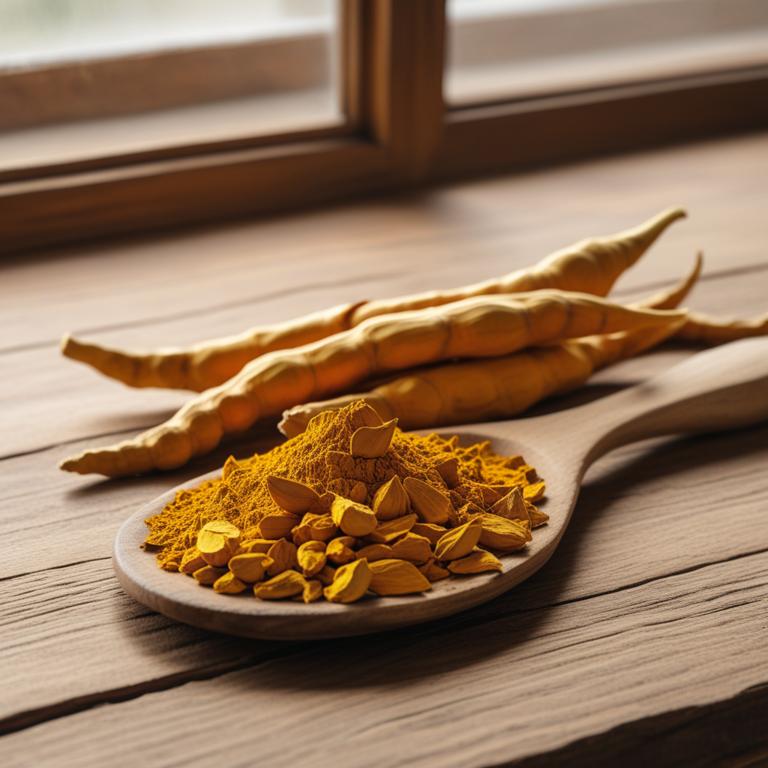
Bursitis: Causes, Natural Herbs, and Proven Preparations

Causes of Joint Pain and Natural Relief through Medicinal Herbs and Preparations
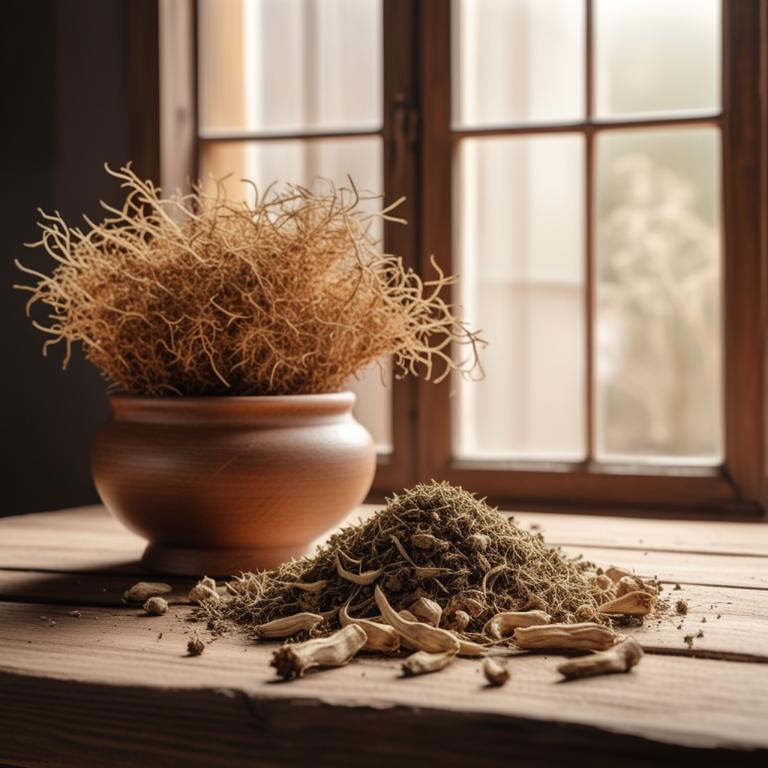
Frozen Shoulder: Causes, Symptoms, and Natural Remedies with Medicinal Herbs
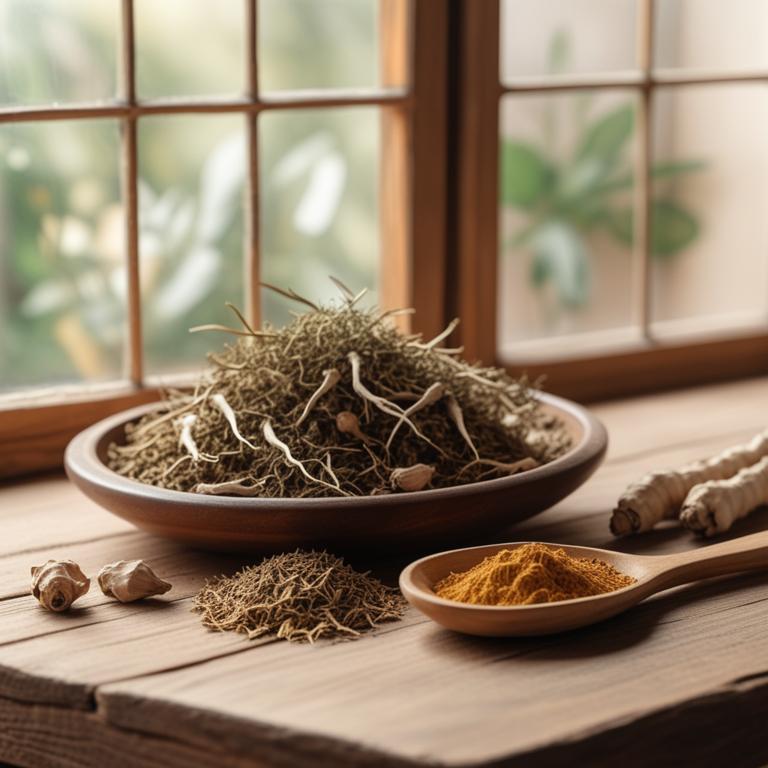
Knee Swelling: A Guide to Medicinal Herbs and Natural Preparations






